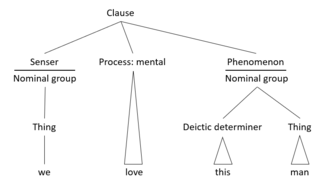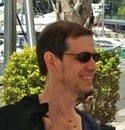Evolutionary linguistics or Darwinian linguistics is a sociobiological approach to the study of language. Evolutionary linguists consider linguistics as a subfield of sociobiology and evolutionary psychology. The approach is also closely linked with evolutionary anthropology, cognitive linguistics and biolinguistics. Studying languages as the products of nature, it is interested in the biological origin and development of language. Evolutionary linguistics is contrasted with humanistic approaches, especially structural linguistics.

Ferdinand de Saussure was a Swiss linguist, semiotician and philosopher. His ideas laid a foundation for many significant developments in both linguistics and semiotics in the 20th century. He is widely considered one of the founders of 20th-century linguistics and one of two major founders of semiotics, or semiology, as Saussure called it.

Functional linguistics is an approach to the study of language characterized by taking systematically into account the speaker's and the hearer's side, and the communicative needs of the speaker and of the given language community. Linguistic functionalism spawned in the 1920s to 1930s from Ferdinand de Saussure's systematic structuralist approach to language (1916).
The following outline is provided as an overview and topical guide to linguistics:

Semantics is the study of reference, meaning, or truth. The term can be used to refer to subfields of several distinct disciplines, including philosophy, linguistics and computer science.
Linguistics is the scientific study of language, involving analysis of language form, language meaning, and language in context.
Cognitive linguistics is an interdisciplinary branch of linguistics, combining knowledge and research from cognitive science, cognitive psychology, neuropsychology and linguistics. Models and theoretical accounts of cognitive linguistics are considered as psychologically real, and research in cognitive linguistics aims to help understand cognition in general and is seen as a road into the human mind.

Analogy is a comparison or correspondence between two things because of a third element that they are considered to share.
Adele Eva Goldberg is an American linguist known for her development of construction grammar and the constructionist approach in the tradition of cognitive linguistics.
Philosophy of psychology is concerned with the history and foundations of psychology. It deals with both epistemological and ontological issues and shares interests with other fields, including philosophy of mind and theoretical psychology. Philosophical and theoretical psychology are intimately tied and are therefore sometimes used interchangeably or used together. However, philosophy of psychology relies more on debates general to philosophy and on philosophical methods, whereas theoretical psychology draws on multiple areas.

An image schema is a recurring structure within our cognitive processes which establishes patterns of understanding and reasoning. As an understudy to embodied cognition, image schemas are formed from our bodily interactions, from linguistic experience, and from historical context. The term is introduced in Mark Johnson's book The Body in the Mind; in case study 2 of George Lakoff's Women, Fire and Dangerous Things: and further explained by Todd Oakley in The Oxford handbook of cognitive linguistics; by Rudolf Arnheim in Visual Thinking; by the collection From Perception to Meaning: Image Schemas in Cognitive Linguistics edited by Beate Hampe and Joseph E. Grady.
Construction grammar is a family of theories within the field of cognitive linguistics which posit that constructions, or learned pairings of linguistic patterns with meanings, are the fundamental building blocks of human language. Constructions include words, morphemes, fixed expressions and idioms, and abstract grammatical rules such as the passive voice or the ditransitive. Any linguistic pattern is considered to be a construction as long as some aspect of its form or its meaning cannot be predicted from its component parts, or from other constructions that are recognized to exist. In construction grammar, every utterance is understood to be a combination of multiple different constructions, which together specify its precise meaning and form.
Dedre Dariel Gentner is an American cognitive and developmental psychologist. She is the Alice Gabriel Twight Professor of Psychology at Northwestern University, and a leading researcher in the study of analogical reasoning.
Cognitive grammar is a cognitive approach to language developed by Ronald Langacker, which hypothesizes that grammar, semantics, and lexicon exist on a continuum instead of as separate processes altogether. This approach to language was one of the first projects of cognitive linguistics. In this system, grammar is not a formal system operating independently of meaning. Rather, grammar is itself meaningful and inextricable from semantics.

In analytic philosophy, philosophy of language investigates the nature of language and the relations between language, language users, and the world. Investigations may include inquiry into the nature of meaning, intentionality, reference, the constitution of sentences, concepts, learning, and thought.
Structural linguistics, or structuralism, in linguistics, denotes schools or theories in which language is conceived as a self-contained, self-regulating semiotic system whose elements are defined by their relationship to other elements within the system. It is derived from the work of Swiss linguist Ferdinand de Saussure and is part of the overall approach of structuralism. Saussure's Course in General Linguistics, published posthumously in 1916, stressed examining language as a dynamic system of interconnected units. Saussure is also known for introducing several basic dimensions of semiotic analysis that are still important today. Two of these are his key methods of syntagmatic and paradigmatic analysis, which define units syntactically and lexically, respectively, according to their contrast with the other units in the system.
Formal semantics is the study of grammatical meaning in natural languages using formal tools from logic, mathematics and theoretical computer science. It is an interdisciplinary field, sometimes regarded as a subfield of both linguistics and philosophy of language. It provides accounts of what linguistic expressions mean and how their meanings are composed from the meanings of their parts. The enterprise of formal semantics can be thought of as that of reverse-engineering the semantic components of natural languages' grammars.

In linguistics, the term formalism is used in a variety of meanings which relate to formal linguistics in different ways. In common usage, it is merely synonymous with a grammatical model or a syntactic model: a method for analyzing sentence structures. Such formalisms include different methodologies of generative grammar which are especially designed to produce grammatically correct strings of words; or the likes of Functional Discourse Grammar which builds on predicate logic.

Philippe Monneret is a French linguist. He is Professor of Linguistics at University of Burgundy since 2004 and at Paris-Sorbonne University since 2015. In 2003, he founded Les Cahiers de Linguistique Analogique and created the field of analogical linguistics. He is a member of the editorial board of «Romanica Olomucensia».
Theory of language is a topic from philosophy of language and theoretical linguistics. It has the goal of answering the questions "What is language?"; "Why do languages have the properties they have?"; or "What is the origin of language?". In addition to these fundamental questions, the theory of language also seeks to understand how language is acquired and used by individuals and communities. This involves investigating the cognitive and neural processes involved in language processing and production, as well as the social and cultural factors that shape linguistic behavior.








